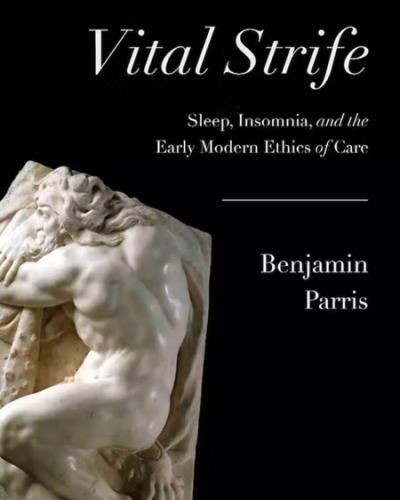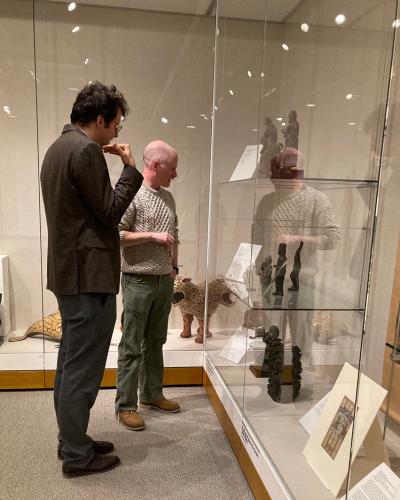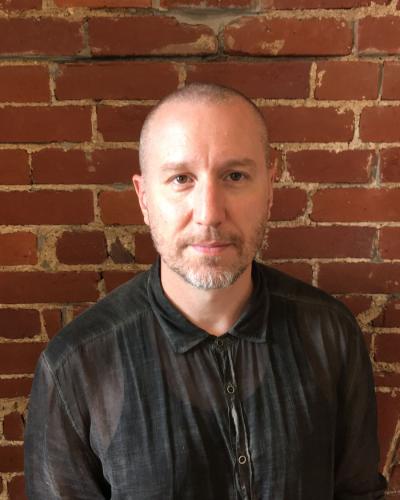This iteration of the Fellows' Q&A series features Benjamin Parris, Visiting Assistant Professor of English at the University of Pittsburgh and 2014-15 "Sensation" Society Fellow. His new book, Vital Strife: Sleep, Insomnia, and the Early Modern Ethics of Care, was released in August 2022 from Cornell University Press.
Big Picture
My book Vital Strife: Sleep, Insomnia, and the Early Modern Ethics of Care is about the close yet puzzling relationship between sleep and ethical care in early modern thought (ca. 1500-1700). Care was understood by Renaissance humanist literary culture in highly ambivalent terms. It could at once refer to a watchful, worrying, or even distressed state of attention that was potentially harmful, but it could also refer to practices of nurturing solicitude, therapeutic attentiveness, or forms of healing for the body and soul. Care was thus seen as fundamentally necessary to the pursuit of virtue but also as something that could open the door to excessive forms of wakeful vigilance. My book explores how early modern writers trained under the
Renaissance humanist paradigm of attentive care in their own intellectual and ethical lives were fascinated by the paradoxes of care that defined conditions of sleep and sleeplessness for early modern thinkers. While sleep was seen as a necessary form of care for embodied human life, sleeplessness was increasingly seen as a threat to the well-being and ethical flourishing of individual and collective forms of life. This represents a shift from longstanding wisdom in Christian theological and ethical writings that align sleep, rather than sleeplessness, with threatening forms of vulnerability and temptation to sin. Ultimately, my book argues that works by Jasper Heywood, William Shakespeare, Edmund Spenser, John Milton, and Margaret Cavendish draw heavily on the ethical cosmology of ancient Stoicism—its theories of bodily matter, vitality, and ethical care—as they construct their own visions of the restorative powers of sleep and shift our attention to the perils of insomnia. In doing so, Vital Strife aims to renew interest in ancient Stoic thought while also challenging the predominant understanding of Stoicism as a philosophy that renounces feeling and sympathetic connection with others. At the same time, my book shows how early modern thinking about sleep plays a crucial role in the histories of virtue ethics, life sciences, and what Michel Foucault first described as biopolitics, or the form of governmental power that takes the proliferation, surplus, and care of biological life as its chief concern.
In Particular
The writers I discuss closely align sleep with the most fundamental impulses of animal vitality and with the core sensation of feeling oneself to be a living, embodied creature. In this way, they draw on the ancient Stoic theory of oikeiôsis, which lacks a precise English translation but has been rendered as affiliation, belonging, appropriation, and being-near-and-dear. The word is related to the ancient Greek term for home, oikos, and it names not only these first impulses of life and sensation among all animal creatures, but also the natural orientation toward—or care for—those things that are conducive to animal wellbeing and flourishing. For human animals, this includes the development of our capacities for reason into its most developed form of expression, which is considered to be virtue, or wisdom, among the Stoics.
My book shows how writers such as Shakespeare and Milton conceive the life of characters ranging from Kings Hamlet, Macbeth, and Lear to Adam, Eve, and the angelic host of Heaven in ways that build on these and other Stoic principles related to the theory of oikeiôsis and the school’s ethical cosmology of care. Shakespeare, for instance, suggests that sovereign insomnia is uniquely threatening to the lives of both the monarch and the kingdom alike, because it disrupts the restorative rhythms of sleep that heal the sovereign’s physical life. According to the political theology of the King’s Two Bodies, the sovereign’s body natural was tied, until the event of physical death, to the metaphysical body politic for which the sovereign cared both day and night. Shakespeare uses Hamlet, Macbeth, and Lear’s sleep and insomnia to suggest that the monarch’s physical life, in such altered states, can actually impinge upon and threaten the integrity of the King’s Two Bodies well before the event of physical death and the supposed transfer of sovereign power from one monarch to the next.
For Milton, like the Stoics, sleep is a therapy that restores life through contact with its rational and vitalistic foundations in a physically living cosmos.
Meanwhile, I argue that recurring images of sleep and wakefulness in John Milton’s Paradise Lost constitute poetic adaptations of the Stoic theory of oikeiôsis. For Milton, like the Stoics, sleep is a therapy that restores life through contact with its rational and vitalistic foundations in a physically living cosmos. His poem’s Christianization of central features of the ethical cosmology of Stoicism appears in its depictions of care as a heavenly virtue perfected by God’s sleepless watch over His creation, echoed in turn by the angelic circle of care that bounds the garden of Eden while the first couple sleep, and given waking human shape through the harmonious activities that constitute the basis of Adam and Eve’s domestic affiliation in their paradisal garden. At the same time, the poet fundamentally connects his vision of the origin of evil as a state of ontological privation to the condition of insomnia—an outgrowth of gnawing nocturnal care that causes Satan to awaken into a new form of life as a fallen creature. Satanic care, that is, gives rise to a deficient mode of individuation that breaks from the union of angelic slumber and the blissfully vitalist landscape of sleep in Heaven, as depicted in the archangel Raphael’s conversation with Adam. For Milton, insomnia thus figures the origin and alienating consequences of an evil whose influence eventually spreads into the first human couple’s bower like a cosmic pestilence in Seneca’s Stoic tragedies.
Discovery
As I delved further into my research on Stoic philosophy and especially writings by or positions attributed to the original Athenian Stoics—Zeno, Chrysippus, and Cleanthes—I was surprised by how different I found their ideas to be from what I had encountered in most of the critical work on Stoicism and its early modern reception. For the most part, Stoicism is seen as an obdurate and deeply impractical system of self-care that seeks above all else to eliminate the vagaries of feeling and the mistaken influence of emotion, in favor of constructing a self that is radically isolated from everyone and everything else in the world. This supposed paradigm of virtue means that the Stoic sage is set radically apart from all things except for their own soul and its rational foundations.
The Stoic sage is actually a rare figure—described as someone who appears about as frequently as the mythical bird known as the phoenix, which is to say, almost never!
What I actually found in ancient Stoic philosophy and in the careful analysis of it by capable philosophers and historians of thought was quite different: a fascinatingly strange but rigorous and coherent system that held the cosmos to be a single, living organism composed of innumerable parts (including us), each of which is itself an infinitely subtle mixture of physical matter and what the Stoics call pneuma, the active principle or animating fire of rationality that moves through the entire cosmos and holds it together through a web of causation. The Stoic sage is actually a rare figure—described as someone who appears about as frequently as the mythical bird known as the phoenix, which is to say, almost never! And virtue is not a condition of isolated rationality enjoyed by the master whose life is set apart from the lives of others, but instead a way of living in harmony with nature and with the guiding rationality of the cosmic whole, which necessarily involves being both open to and caring for the fluctuating motions of the physical mixtures that form the material fabric of the cosmos and which situate us in our own bodies. Our reason is simply one part of this cosmic rationality, according to the Stoics, so it doesn’t “belong” to us in any absolute sense. If we learn to use it in its highest expression as wisdom, we are manifesting that which nature has given us and intended us to manifest as such.
Fellowship
My year at the Society was profoundly important, and it shaped several crucial threads in the argument of Vital Strife. While I had already been working to some extent with Stoic images of sleep from Seneca’s tragedy, Hercules Furens, my conversations with another fellow, Amanda Jo Goldstein, led me to think more carefully about the project’s connection to Stoicism, especially with regard to the ancient school’s theories of matter and bodily causation. At the time Amanda was completing her own book on the Romantic reception of Epicurean materialism, so I found working and thinking alongside her to be quite helpful. Another fellow, Anne Cvetkovitch, encouraged me to see how my project’s relationship to early modern affect and the bodily passions could also help me frame the book in such a way as to appeal more broadly to literary critics working on similar topics in later periods. And finally, I owe a massive debt to Verity Platt, who was a fellow at the time and an authority on classical culture who first alerted me to the concept of oikeiôsis, which became absolutely central to the book. Alongside these particular fellows’ contributions, my weekly seminars, ongoing conversations, and friendship with all the fellows and the director at the time, Tim Murray, were a great source of intellectual inspiration and camaraderie during my year in Ithaca. And the talks, workshops, and conferences hosted by the Society and the university more broadly were a wonderful way to stay on top of what was happening in the humanities across a range of fields, historical periods, and methodologies while also helping me craft my own unique approach to my book. Finally, the two Society Fellows, Lauren Berlant and Susanna Siegel, were both incredibly supportive and enthusiastic about my project during their visits. I feel a deep sense of joy and gratitude to have spent time with Lauren, and real grief for what we have all lost with their passing.






